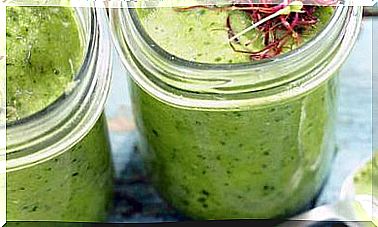Eat Mindfully And Connect With Your Emotions
Often eaten on impulse without savoring food, valuing it, or appreciating its beneficial effects on the body.

You have just prepared your favorite dish, vegetable lasagna; You serve yourself a portion and sit at the table to enjoy it. And you decide to do it without haste. You take off your watch, turn off your electronics, and just get ready to eat.
You look at the lasagna first, you stop at the colors of the vegetables, the shine of the tomato sauce. Next, you delight in the delicious aroma that emanates and, closing your eyes, you try to identify each ingredient. So, you cut a portion, put it in your mouth and savor it slowly, enjoying each flavor, feeling the textures of the different elements.
You chew slowly, over and over again, and slide the food down your throat to your stomach. You feel like the lasagna is really tasty. And you wait a moment before picking up the silverware again and taking a new bite. Savoring food in this way allows us to enjoy food intensely and also helps us connect with our emotions.
This is what ‘mindful eating’ or conscious eating proposes , a discipline that arises from adapting the teachings of meditation and mindfulness typical of yoga and Buddhism to the field of nutrition. It is about involving our conscience by paying attention to the sensations that each bite produces and the reasons that push us to take it.
” Eating consciously and well gives us a series of intellectual and emotional resources. We are a unit, and we think and feel as we eat. In this way, the better you eat, the freer the thought, the less mental ties you have and the less emotional hindrances you drag. “says Dr. Jorge Pérez-Calvo, an expert in integrative medicine and author of Foods that heal (Ed. Oniro).
Unconscious feeding
However, spending quality time to eat is not an easy task. The busy life, full of obligations and “I don’t have time” often leads us to an unconscious diet : we eat almost swallowing, hardly noticing what we have on our plate and filling our stomachs much more than we need, which ends up having an impact on the scale and on health.
“In the times we live in, with the duties and obligations that we have, food has become almost a formality. We are not even aware of what we like. And so, without consciousness, eat your body, but not your mind”, affirms Isabel Menéndez, psychoanalyst and author of the book Emotional Food (Ed. Grijalbo).
Sometimes we open the refrigerator and stare trying to figure out what we want to eat. When that happens, we may not be physically hungry, but want to get something, two different concepts that we confuse.
“Sometimes we have a bag of potatoes or a croissant, because we feel lonely, because we get bored because we are angry, because we have anxiety, because we have argued. There are people who feel accompanied if they have a full stomach. When that happens it is because We are not in tune with ourselves, we do not listen to ourselves and we eat on impulse “, says María Pilar Casanova, conscious eating coach and co-founder of Dare to eat.
Eating because of an emotional conflict has to do with not knowing how to manage what happens to us. And in this sense, for the psychoanalyst Isabel Menéndez, “food works like pills, as a kind of emotional painkiller that we take when something hurts. So we use food not to nourish ourselves, but as a drug. And that will do to us. get sick and it will make us fat. Conscious eating connects with your emotions and breaks the automatisms that lead to eating without thinking “, adds Isabel Menéndez.
Frequently, the extra kilos are usually fought by practicing sports and especially by submitting to diets, which serve to lose weight in the short term but not to be thin. Once we return to our eating habits, if we have not managed to connect the fork (food) with the handkerchief (painful emotions) we will regain weight.
In addition, for Susan Albers, an expert psychologist in eating disorders and author of Mindfulness and Eating, subjecting the body to a diet is detrimental to mental and physical emotional well-being, since it inhibits the ability to carefully decode the messages and responses of the body. “An unconscious eating diet is like cutting with a knife the only way of communication with our mind,” he considers.
A healthy and full life
The Buddha is said to have discovered that mastering mindful eating was essential for his spiritual growth. As he had been born into a royal family, he had been able to enjoy the most delicious delicacies of India and that had led him to put on weight.
But those delicacies that he tasted every day did not bring him happiness. Thus, after abandoning life at court and seeking enlightenment, he went on extreme fasts, but this weakened him and he was on the point of death. The Buddha learned that eating too much and too little was not beneficial to his health or well-being.
And that only the understanding of genuine needs and mental balance allow to lead a healthy and happy life. In a way that is what mindful eating advocates . The key to maintaining the correct weight and good health is taking responsibility for how, what and why we eat.
It is about acquiring more emotional intelligence, knowing how to interpret how we feel and relearning how to eat by listening to our body. For this, it is necessary to distance ourselves and get away from the impulse, in order to be able to reconsider. And that’s where mindfulness comes in.
“Mindfulness gives us that necessary space to think and stop. Meditating a few minutes every day, perhaps before sitting down at the table, will help us create that separation between the stimulus and our action,” explains María Pilar Casanova. “We have a highly plastic brain and it has been proven that it takes just eight weeks of meditation to increase the prefrontal cortex of the brain, related to all the essential emotional intelligence skills to reconnect emotions with the stomach.”
A simple way to start creating that space is, simply, when you get home tired, stressed after work and wanting to eat something, have a glass of water. “It works as a physical barrier, breaks with the worries that we carry in the head, creates that physical space necessary to stop the impulse. It returns you to the here and now”, adds Pilar Casanova.
Learn to listen to us
Mindful eating is based on learning to listen to ourselves , to be aware of physical hunger and when we are satiated to guide our decision to start eating and also to stop. So, the first thing to do is to identify if we really are physically hungry, which usually manifests itself with noise, small stomach cramps or light dizziness. And then learn to know when we stop having it.
90% of the time we finish the plate to see it empty. We have a brain programmed to store calories. And it is important to break with this dynamic. “Your unconscious has to learn that if you already have enough, you don’t have to finish the whole plate. So start by serving yourself smaller portions. And you shouldn’t eat without hunger. If at dinner time, one day, no You feel hungry, don’t eat dinner “, advises María Pilar Casanova.
It is about choosing those foods that are enriching for the body and using the senses to explore, savor. It is advisable not to prohibit any food, because prohibitions generate desire.
“The problem is not food, and neither are we, but eating without paying attention to what is being done. (If we eat popcorn at the cinema, it will be more difficult to savor it). Hence, it is necessary to work on the resource of self-confidence. “, says the expert in conscious eating.
Another principle of mindful eating is that when you eat, you just eat. This rule means not doing it in front of the television, nor reading, because that makes it difficult for us to learn to connect with ourselves.
“Even if it is once a day, it is essential to give ourselves time, without haste with the people we love, to enjoy what we eat but also to nourish ourselves and to think about ourselves, something that we do little,” advises Isabel Menéndez.
Eating responsibly has to do with becoming aware of where what we eat comes from and its environmental impact, says Dr. Pérez-Calvo. “What we put on our plate every day has repercussions not only on our health but on the health and conservation of the planet. Thinking about it carefully when we sit down at the table is eating with awareness. Deep down, conscious eating is a courageous attitude before life “, assures Jorge Pérez-Calvo.









